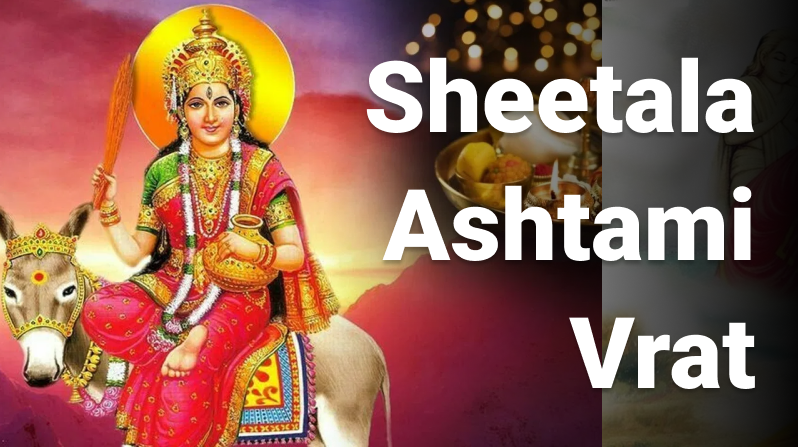
Sheetala Ashtami is a traditional Hindu festival observed on the eighth day (Ashtami) of the Krishna Paksha (waning phase of the moon) in the month of Chaitra (March–April). Devoted to Goddess Sheetala, this vrat is primarily observed by women for the health and protection of their children and families.
2. Significance of Sheetala Ashtami Vrat
Goddess Sheetala is believed to ward off diseases like smallpox, chickenpox, and other contagious illnesses. The vrat is a prayer for good health and immunity for the entire household. It also teaches respect for hygiene and clean food.
3. When is Sheetala Ashtami Observed?
Sheetala Ashtami is observed on the eighth day after Holi. In 2025, Sheetala Ashtami will be celebrated on March 22nd. The observance may vary slightly depending on regional customs and lunar calendars.
4. Mythological Background (Vrat Katha)
According to legend, Goddess Sheetala rides a donkey and carries a broom, a pot of cold water, and medicinal herbs. She punishes those who neglect cleanliness and rewards those who uphold hygiene. The katha narrates how she protected devotees from epidemics and healed those afflicted.
5. How to Observe the Vrat
Preparation: All food for the next day is cooked a day before (on Saptami).
Fasting Day (Ashtami):
Devotees do not cook fresh food.
People consume stale food (called ‘Basi’ food) as a mark of tradition.
Wake up early, bathe with cold water, and wear clean clothes.
Offer prayers to Sheetala Mata with turmeric, curd, and flowers.
6. Rituals and Traditions
Visit Sheetala Mata temples or set up a shrine at home.
Offer cold foods like puri, sweets, rice, and curd.
Worship with neem leaves, haldi (turmeric), and water.
Distribute the food to family members and neighbors.
7. Foods and Offerings
Typical Offerings: Basi puri, curd, rice, jaggery, and sweets prepared the previous day.
Food is kept in clean utensils and served without reheating.
The concept signifies that food, when prepared with purity, remains sacred.
8. Scientific and Cultural Perspectives
This vrat has a basis in seasonal change. As winter ends and summer begins, food preservation and hygiene become critical. Eating light, cold food and focusing on cleanliness helps prevent heat-induced illnesses.
9. Regional Variations
North India: Women gather at temples with offerings.
Rajasthan and Gujarat: Large processions and fairs are held.
Uttar Pradesh and Bihar: Basi food is ritually shared among communities.
10. Dos and Don’ts of Sheetala Ashtami
Do’s:
Observe cleanliness and purity.
Prepare offerings with devotion.
Read the Sheetala Mata Vrat Katha.
Don’ts:
Do not light the stove or cook fresh food on the vrat day.
Avoid using hot water for bathing.
Do not use foul language or exhibit anger.
11. Spiritual Benefits
Protection from illnesses.
Purification of body and mind.
Enhancement of family bonding and communal harmony.
Inner peace through devotion and discipline.
12. Sheetala Ashtami in Modern Times
Even in urban areas, families observe Sheetala Ashtami to stay connected to tradition. Eco-conscious celebrations with natural ingredients and awareness drives about hygiene are gaining popularity.
13. Frequently Asked Questions (FAQ)
Q1: Can men observe Sheetala Ashtami vrat? Yes, although mostly observed by women, men can also participate in the vrat and puja.
Q2: Why is only stale food eaten on this day? It is a traditional way to honor Sheetala Mata and emphasize the importance of purity and conservation.
Q3: Can milk and fruits be consumed during the vrat? Yes, if not freshly prepared or boiled that day.
Q4: Is it compulsory to visit a temple? Not mandatory. Worship at home with devotion is equally powerful.
Q5: What if someone accidentally cooks food on Ashtami? Continue the vrat with devotion and avoid cooking next time.
14. Conclusion
Sheetala Ashtami Vrat is a blend of devotion, discipline, and ancient wisdom. By promoting health, hygiene, and family welfare, this vrat remains relevant in today’s world. Observing it with sincerity brings not just blessings of health but also strengthens spiritual roots.